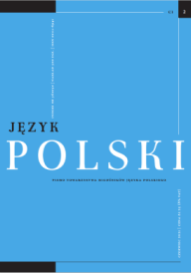Abstract
The author proposes that the notion of correctness would be replaced with the notion of proper language use. In this approach, the linguistic element (meaning, form, structure) is assessed in a specific statement, in given communicative circumstances, and not in isolation – in an absolute manner. In practice, in orthoepic dictionaries, this aspect is actually omitted or the decisions on this issue are sometimes arbitrary, and as a result, the assessment is universal (without being dependent on the context). In the light of the available representative text samples, we are able today to precisely define the scope of possible limitations in the occurrence of words, their meanings, structures, forms and combinations. The role of a linguist who popularizes the culture of language is to describe the aforementioned limitations as precisely as possible, by building their profile (stylistic, chronological, environmental, domain, politeness, etc.).
References
Bartmiński J. 1991: Styl potoczny jako centrum systemu stylowego języka, [w:] S. Gajda (red.), Synteza w stylistyce słowiańskiej. Materiały konferencji z 24–26 IX 1990 r. w Opolu, Wyższa Szkoła Pedagogiczna im. Powstańców Śląskich w Opolu, Instytut Filologii Polskiej, Opole, s. 33–47.
View on Google Scholar
Buttler D., Kurkowska H., Satkiewicz H. 1971: Kultura języka polskiego. Zagadnienia poprawności gramatycznej, Państwowe Wydawnictwo Naukowe, Warszawa.
View on Google Scholar
Chałasiński J. 1946: Socjologia i historia inteligencji polskiej, „Kuźnica. Tygodnik społeczno-literacki” 20, s. 1–3.
View on Google Scholar
Cywiński B. 1971: Rodowody niepokornych, Biblioteka „Więzi”, Warszawa.
View on Google Scholar
Doroszewski W. 1962: O kulturę słowa. Poradnik językowy, Państwowy Instytut Wydawniczy, Warszawa.
View on Google Scholar
Gałuszka M. 2009, Elity medyczne versus elity polityczne: kryzys elit zaufania publicznego, „Annales. Etyka w życiu gospodarczym” 12, s. 13–23.
View on Google Scholar
Kulas P. 2017: Inteligenckość zaprzeczona. Etos i tożsamość młodych inteligenckich elit, Wydawnictwo Naukowe Scholar, Warszawa.
View on Google Scholar
Markowski A. 2012: Kultura języka polskiego. Teoria. Zagadnienia leksykalne, Wydawnictwo Naukowe PWN, Warszawa.
View on Google Scholar
Puzynina J. 1992: Język wartości, Wydawnictwo Naukowe PWN, Warszawa.
View on Google Scholar
Wierzbicka A. 1990: Język antytotalitarny w Polsce: o pewnych mechanizmach samoobrony językowej, „Teksty Drugie” 4, s. 5–30.
View on Google Scholar
Wilk E. 2017: Jakie są winy i obowiązki polskich elit, „Polityka” 26.09.2017 (online: https://www.polityka.pl/tygodnikpolityka/spoleczenstwo/1721054,2,jakie-sa-winy-i-obowiazki-polskich-elit.read?page=62&moduleId=4686, dostęp: 12 stycznia 2020).
View on Google Scholar


